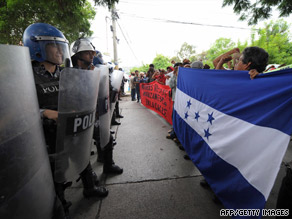
In a tit-for-tat move, the de facto government of Honduras ordered Argentine diplomats to leave the fractured Central American country.
After meeting with ousted Honduran president Manuel Zelaya, Argentine officials insisted that Honduran ambassador to Argentina Carmen Ortez Williams
refuse recognizing the interim government led by Roberto Micheletti. The Argentine government subsequently
expelled Williams though without severing ties to Honduras.
In his decision to cut ties with Argentina, Micheletti continued
showing defiance against his regional detractors:
"If Argentina decided to expel us then we will do the same thing," Micheletti said. "We have to act the same way they are acting with us."
Argentine Foreign Relations Secretary Jorge Taiana dismissed the expulsion order. "We maintain diplomatic relations with the legitimate government Honduras and ignore any deadline about anything," Taiana told reporters in Mexico, where he is on a diplomatic visit.
Micheletti has previously ordered Venezuelan diplomats to leave
but they’ve refused after citing the “illegitimacy” of the de facto regime.
On a related note, State Department officials met today with a delegation representing the Micheletti government while Secretary of State Hillary Clinton called for a “
negotiated solution.” The U.S. has faced criticism over backing the return of Zelaya as well as accusations of
supporting Zelaya’s removal last June.
Image- CNN (“Riot police stand in front of marchers supporting ousted Honduran President Manuel Zelaya on Tuesday.”)
Online Sources- Xinhua, AFP, AP, The Latin Americanist, etainwannews.com, BBC News,
 * U.S.: Six European Union nations have privately committed to taking in Guantanamo detainees according to unnamed White House sources cited by the Washington Post.
* U.S.: Six European Union nations have privately committed to taking in Guantanamo detainees according to unnamed White House sources cited by the Washington Post.











